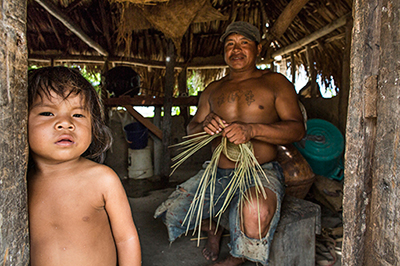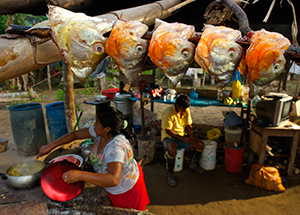 In a 2005 report from the African Commission on Human and People’s Rights (ACHPR) and the International Work Group for Indigenous Affairs (IWGIA), refers to ‘indigenous peoples’ as
In a 2005 report from the African Commission on Human and People’s Rights (ACHPR) and the International Work Group for Indigenous Affairs (IWGIA), refers to ‘indigenous peoples’ as
“a global movement fighting for rights and justice for those particular groups who have been left on the margins of development and who are perceived negatively by dominating mainstream development paradigms, whose culture and ways of life are subject to discrimination and contempt and whose very existence is under threat of extinction” (ACHPR and IWGIA 2006:11)
Throughout the Amazon, not only are indigenous peoples largely excluded from political, economic, social and cultural life, but many communities still do not have any land rights over the traditional territories within which they make their livelihoods (Hall and Patrinos, 2005). Compared to the non-indigenous population, indigenous people experience extreme poverty, lower life expectancy, higher rates of child mortality, inadequate or absent schooling, higher levels of illiteracy, fewer income generation and employment possibilities, dispossession of their traditional land, limited access to basic public services, and fewer opportunities to exercise self-determination or participate in the regional and national political process. On top of these injustices, indigenous culture is usually portrayed, at best, as a touristic curiosity, and at worst, an impediment to economic progress within a globalised society.
The devaluation of the indigenous way of life, including traditional landscape management practices, often justifies official ‘development’ projects within traditional indigenous territories and a lax approach to policing human rights abuses and illegal encroachment on officially designated indigenous territories. More often than not, this results in an exodus of young men away from indigenous communities towards urban settlements, significantly undermining the cohesiveness and long-term survival prospects of communities.
European colonisation
 The impact of the European colonisation on native populations between the 16th and 20th centuries was devastating. In Brazil alone, population estimates show a change from between several million people (Hutchison et al., 2006) prior to the colonisation to between 180,000 and 350,000 people today (Pinheiro, 2004). Causes include the spreading of European and African diseases - to which native people had no immunity - alcohol consumption, proxy wars, slavery, displacements and removal (Burnett, 2002; Hemming, 1978; Whitehead, 1990). In 19th century British Guyana, Schomburgk calculated that only a few thousands Amerindians were left, compelling him to write, in 1836:
The impact of the European colonisation on native populations between the 16th and 20th centuries was devastating. In Brazil alone, population estimates show a change from between several million people (Hutchison et al., 2006) prior to the colonisation to between 180,000 and 350,000 people today (Pinheiro, 2004). Causes include the spreading of European and African diseases - to which native people had no immunity - alcohol consumption, proxy wars, slavery, displacements and removal (Burnett, 2002; Hemming, 1978; Whitehead, 1990). In 19th century British Guyana, Schomburgk calculated that only a few thousands Amerindians were left, compelling him to write, in 1836:
“the aboriginal races of Guiana seem to be fearfully hastening, as by divine decree, to complete annihilation” (Schomburgk, 1836:104)
Wiessner argues that by the 19th century, the dispossession of Amerindians was nearly complete. Furthermore, with the loss of their ancestral lands to which their culture was intimately related, the few communities that had survived were facing another sort of extinction.
“[T]he process of colonization has left so-called indigenous peoples defeated, relegated to minor spaces, reservations, bread-crumbs of land conceded by the dominant society. Indians were separated from their sacred land, the land of their ancestors, and from their burial grounds with which they shared a deeply spiritual bond. Deprived of traditional environments, they were not only politically, but economically, culturally, and religiously dispossessed” (Wiessner, 1999:58-59)
These challenges are very much issues which many indigenous communities can identify with even today. To cite just one of countless examples currently in the news, this is an extract from a 28th of January 2013 press release by the Forest Peoples Program, an international civil society organisation fighting for indigenous rights:
“On 17 January 2013, the Guyanese High Court ruled in favour of a miner who has a mining concession on titled indigenous lands. The ruling states that miners who obtained mining permits prior to the Amerindian Act of 2006 are not bound by its provisions, and consequently do not have to obtain permission from indigenous villages before carrying out operations on village land.
This ruling sets a negative precedent for the indigenous peoples of Guyana, who have been seeking to have their lands recognised and respected for decades. It also exposes the lack of adequate protections for indigenous lands in Guyana, a situation which will only be exacerbated as pressures from mining, logging, and carbon projects grow.”
Next: How can the Amazon survive?
This page is part of our series of articles on the Amazon System, emerging out of the experience of Dr Andrea Berardi, a Lecturer in Environmental Information Systems at The Open University to support the BBC Two series I Bought a Rainforest. See the full reference list for these articles.
Dr Berardi is a co-investigator on Project COBRA. COBRA is researching ways to integrate community solutions within policies addressing escalating social, economic and environmental crises, through accessible information and communication technologies.
Rate and Review
Rate this article
Review this article
Log into OpenLearn to leave reviews and join in the conversation.
Article reviews